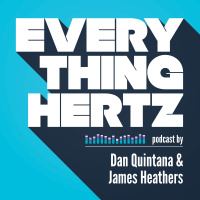Everything Hertz
- Autor: Vários
- Narrador: Vários
- Editora: Podcast
- Duração: 171:31:33
- Mais informações
Informações:
Sinopse
A podcast by scientists, for scientists. Methodology, scientific life, and bad language. Co-hosted by Dr. Dan Quintana (University of Oslo) and Dr. James Heathers (Northeastern University)
Episódios
-
187: What started the replication crisis era?
03/12/2024 Duração: 55minWe chat about the events that started the replication crisis in psychology and Dorothy Bishop's recent resignation from the Royal Society Links * The resignation blogpost (http://deevybee.blogspot.com/2024/11/why-i-have-resigned-from-royal-society.html) from Dorothy Bishop * The bluesky post (https://bsky.app/profile/sarahwieten.bsky.social/post/3lbtsqc6jcs2z) from Sarah Weiten that asked the question, "If you had to cite an event that opened the "replication crisis" era, what would you point to?" * The "Year of Horrors" paper (https://www.ejwagenmakers.com/2012/Wagenmakers2012Horrors.pdf) from Eric-Jan Wagenmakers Other links Everything Hertz on Bluesky - Dan on Bluesky (https://bsky.app/profile/dsquintana.bsky.social) - James on Bluesky (https://bsky.app/profile/jamesheathers.bsky.social) - Everything Hertz on Bluesky (https://bsky.app/profile/hertzpodcast.bsky.social) Support us on Patreon (https://www.patreon.com/hertzpodcast) and get bonus stuff! $1 per month: A 20% discount on Everything Hertz merchan
-
186: Evaluating journal quality
13/11/2024 Duração: 43minIn this episode we chat about a Nordic approach for evaluating the journal quality and how we should be teaching undergraduates to evaluate journal and article quality Links * The Norwegian journal register (https://kanalregister.hkdir.no/en/informasjonsartikler/about-the-norwegian-register) * The Finnish journal register (https://julkaisufoorumi.fi/en/publication-forum) * Episode 22 (https://everythinghertz.com/22), where we played "Pokemon or Cholesterol medication?" Other links Everything Hertz on social media - Dan on twitter (https://www.twitter.com/dsquintana) - James on twitter (https://www.twitter.com/jamesheathers) - Everything Hertz on twitter (https://www.twitter.com/hertzpodcast) - Everything Hertz on Facebook (https://www.facebook.com/everythinghertzpodcast/) Support us on Patreon (https://www.patreon.com/hertzpodcast) and get bonus stuff! $1 per month: A 20% discount on Everything Hertz merchandise, access to the occasional bonus episode, and the the warm feeling you're supporting the show $5
-
185: The Retraction
04/10/2024 Duração: 01h08minWe discuss the recent retraction of a paper that reported the effects of rigour-enhancing practices on replicability. We also cover James' new estimate that 1 out of 7 scientific papers are fake. Links * The story (https://www.nature.com/articles/d41586-024-02907-3) about data integrity concerns in 130 women’s health papers * James' new preprint (https://osf.io/23zcr) with the estimate that 1 out of 7 scientific papers are fake * The retracted paper in Nature Human Behavior (https://www.nature.com/articles/s41562-023-01749-9) by Protzko and coworkers * The Matters Arising article (https://rdcu.be/dVXN8) from Bak-Coleman and Devezer, who initially raised concerns about the paper from Protzko and coworkers. * The Everything Hertz merch store (https://everything-hertz-podcast.creator-spring.com) * The paper (https://journals.sagepub.com/doi/10.1177/0165551507086261) about puns/jokes in paper titles * The "Everything Hertz" paper (https://www.frontiersin.org/journals/physiology/articles/10.3389/fphys.2014.00177
-
184: A race to the bottom
05/09/2024 Duração: 48minOpen access articles have democratized the availability of scientific research, but are author-paid publication fees undermining the quality of science? The preprint by Morgan and Smaldino - https://osf.io/preprints/osf/3ez9v Paul Smaldino's text book - Modeling social behavior (https://press.princeton.edu/books/paperback/9780691224145/modeling-social-behavior) Main edisode takeaways (AI-assisted summary) There is a wide variability in the quality of papers published in gold open access journals and a wide variate of open access journals, some of which prioritise quality research Diamond open access and green open access are alternative models to consider. The publishing industry needs more transparency and mandatory reporting of data. The pressure to publish more can lead to a crowding out problem and a focus on quantity over quality. Determining the quality of journals and papers is challenging, and there are varying levels of quality within different tiers of journals. Fraudulent publishing practices, suc
-
183: Too beautiful to be true
03/08/2024 Duração: 45minDan and James discuss a paper describing a journal editor's efforts to receive data from authors who submitted papers with results that seemed a little too beautiful to be true Main edisode takeaways (AI generated summary) * This editorial on the reproducibility crisis emphasizes the importance of providing raw data in scientific publications and highlights the need for transparency and accountability in the research process * The lack of oversight and the discrepancy between the amount of data required for scientific statements and what is often provided in academic publishing is a cause for concern. * Ensuring the integrity of scientific research requires the active involvement of editors, reviewers, and researchers in promoting transparency and upholding ethical standards. The scientific publishing process lacks oversight and accountability, leading to potential issues with the accuracy and trustworthiness of published papers. * Journals should prioritize maintaining high standards and ensuring that papers
-
182: What practices should the behavioural sciences borrow (and ignore) from other research fields?
02/07/2024 Duração: 51minDan and James answer a listener question on what practices should the behavioural sciences borrow (and ignore) from other research fields. Here are the main takeaways: Keeping laboratory records and using electronic lab management software is beneficial practices biology that would benefit the behavioral sciences The rate of pre-registration of meta-analysis in psychology is low, unlike other fields, which have a higher pre-registration rate. Here is the preprint on pre-registration of psychology meta-analyses that was mentioned: https://doi.org/10.31222/osf.io/627a4 Case studies (somewhat common in medicine) can provide valuable insights, especially when there is aggressive sampling and oversampling of single points Double-blinded should not be adopted. as these can be challenging to implement effectively and may not always work as intended Philosophers often (but not always) have a clear writing style and structure their arguments well, which can be enjoyable to read and should be more widely adopted The pu
-
181: Down the rabbit hole
03/06/2024 Duração: 42minWe discuss how following citation chains in psychology can often lead to unexpected places, and how this can contribute to unreplicable findings. We also discuss why team science has taken longer to catch on in psychology compared to other research fields. Here is the preprint that we mentioned authored by Andrew Gelman and Nick Brown - https://osf.io/preprints/psyarxiv/ekmdf Our episode with Nick Brown - https://everythinghertz.com/44 Other links Everything Hertz on social media - Dan on twitter (https://www.twitter.com/dsquintana) - James on twitter (https://www.twitter.com/jamesheathers) - Everything Hertz on twitter (https://www.twitter.com/hertzpodcast) - Everything Hertz on Facebook (https://www.facebook.com/everythinghertzpodcast/) Support us on Patreon (https://www.patreon.com/hertzpodcast) and get bonus stuff! $1 per month: A 20% discount on Everything Hertz merchandise, access to the occasional bonus episode, and the the warm feeling you're supporting the show $5 per month or more: All the stuff
-
180: Consortium peer reviews
02/05/2024 Duração: 50minDan and James discuss why innovation in scientific publishing is so hard, an emerging consortium peer review model, and a recent replication of the 'refilling soup bowl' study. Other things they cover and links: * Which studies should we spend time replicating? * The business models of for-profit scientific publishers * How many tacos can you buy with the money it costs to publish open access in Nature? * The original soup bowl study: https://doi.org/10.1038/oby.2005.12 * The replication study: https://doi.org/10.1037/xge0001503 * The Peer Community In initiative: https://peercommunityin.org/ * Stuart Buck's newsletter: https://goodscience.substack.com Other links Everything Hertz on social media - Dan on twitter (https://www.twitter.com/dsquintana) - James on twitter (https://www.twitter.com/jamesheathers) - Everything Hertz on twitter (https://www.twitter.com/hertzpodcast) - Everything Hertz on Facebook (https://www.facebook.com/everythinghertzpodcast/) Support us on Patreon (https://www.patreon.com/hert
-
179: Discovery vs. maintenance
03/04/2024 Duração: 48minDan and James discuss how scientific research often neglects the importance of maintenance and long-term access for scientific tools and resources. Other things they cover: Should there be an annual limit on publications (even if this were somehow possible)? The downsides of PhD by publication The Gates Foundation's new Open Access policy Other links Everything Hertz on social media - Dan on twitter (https://www.twitter.com/dsquintana) - James on twitter (https://www.twitter.com/jamesheathers) - Everything Hertz on twitter (https://www.twitter.com/hertzpodcast) - Everything Hertz on Facebook (https://www.facebook.com/everythinghertzpodcast/) Support us on Patreon (https://www.patreon.com/hertzpodcast) and get bonus stuff! $1 per month: A 20% discount on Everything Hertz merchandise, access to the occasional bonus episode, and the the warm feeling you're supporting the show $5 per month or more: All the stuff you get in the one dollar tier PLUS a bonus episode every month Citation Quintana, D.S., Heathers,
-
178: Alerting researchers about retractions
29/02/2024 Duração: 49minDan and James discuss the Retractobot service, which emails authors about papers they've cited that have been retracted. What should authors do if they discover a paper they've cited has been retracted after they published their paper? Other things they chat about A listener question about including examiner's comments in thesis The different types of retractions and thier impact Why aren't versioning systems more common in scientific publishing? Other links Everything Hertz on social media - Dan on twitter (https://www.twitter.com/dsquintana) - James on twitter (https://www.twitter.com/jamesheathers) - Everything Hertz on twitter (https://www.twitter.com/hertzpodcast) - Everything Hertz on Facebook (https://www.facebook.com/everythinghertzpodcast/) Support us on Patreon (https://www.patreon.com/hertzpodcast) and get bonus stuff! $1 per month: A 20% discount on Everything Hertz merchandise, access to the occasional bonus episode, and the the warm feeling you're supporting the show $5 per month or more: All
-
177: Plagiarism
31/01/2024 Duração: 42minWe discuss two recent plagiarism cases, one you've probably heard about and another that you probably haven't heard about if you're outside Norway. We also chat about the parallels between plagiarism and sports doping—would people reconsider academic dishonesty if they were reminded that future technology may catch them out? Here are some of the takeaways from the episode (generated with the help of AI): Plagiarism cases can range from minor academic practice issues to more serious instances of copying verbatim The detection and punishment of plagiarism can vary depending on the context, such as academic journals or internal university issues. The mindset and motivations behind plagiarism can differ between athletes and students, with athletes often driven by intense competition. Long-term detectability and the potential consequences of cheating are factors that may discourage individuals from engaging in plagiarism. Addressing plagiarism requires a balance between identifying genuine cases and avoiding ideol
-
176: Tracking academic workloads
29/12/2023 Duração: 36minWe chat about a paper on the invisible workload of open science and why academics are so bad at tracking their workloads. This episode was originally recorded in May 2023 in a hotel room just before our live recording of Episode 169, which is why we refer to the paper as a 'new' paper near the start of the episode. Links * The paper (https://journal.trialanderror.org/pub/the-invisible-workload/release/1) on the invisible workload of open research * Our live and in-person episode (https://everythinghertz.com/169) with Sandra Matz on using big data to understand behavior Other links Everything Hertz on social media - Dan on twitter (https://www.twitter.com/dsquintana) - James on twitter (https://www.twitter.com/jamesheathers) - Everything Hertz on twitter (https://www.twitter.com/hertzpodcast) - Everything Hertz on Facebook (https://www.facebook.com/everythinghertzpodcast/) Support us on Patreon (https://www.patreon.com/hertzpodcast) and get bonus stuff! $1 per month: A 20% discount on Everything Hertz mercha
-
175: Defending against the scientific dark arts
07/12/2023 Duração: 38minWe chat about a recent blogpost from Dorothy Bishop, in which she proposes a Master course that will provide training in fraud detection—what should such a course specifically teach and where would these people work to apply their training? We also discuss whether open science is a cult that has trouble seeing outward. Links * The blog post (https://deevybee.blogspot.com/2023/11/defence-against-dark-arts-proposal-for.html) on the Master in dark arts defence from Dorothy Bishop * The blog post (https://statmodeling.stat.columbia.edu/2023/11/29/why-i-continue-to-support-the-science-reform-movement-despite-its-flaws/) on whether open science is a cult from Andrew Gelman Other links Everything Hertz on social media - Dan on twitter (https://www.twitter.com/dsquintana) - James on twitter (https://www.twitter.com/jamesheathers) - Everything Hertz on twitter (https://www.twitter.com/hertzpodcast) - Everything Hertz on Facebook (https://www.facebook.com/everythinghertzpodcast/) Support us on Patreon (https://www.pa
-
174: Smug missionaries with test tubes
01/11/2023 Duração: 53minJames proposes proposes a new type of consortium paper that could provide collaborative opportunities for researchers from countries that are underrepresented in published research papers. We also talk about computational reproducibility and paper publication bonuses. Links The paper from Steve Lindsay on computational reproducbility: A Plea to Psychology Professional Societies that Publish Journals: Assess Computational Reproducibility (https://doi.org/10.15626/MP.2023.4020) Other links Everything Hertz on social media - Dan on twitter (https://www.twitter.com/dsquintana) - James on twitter (https://www.twitter.com/jamesheathers) - Everything Hertz on twitter (https://www.twitter.com/hertzpodcast) - Everything Hertz on Facebook (https://www.facebook.com/everythinghertzpodcast/) Support us on Patreon (https://www.patreon.com/hertzpodcast) and get bonus stuff! $1 per month: A 20% discount on Everything Hertz merchandise, access to the occasional bonus episode, and the the warm feeling you're supporting the
-
173: How do science journalists evaluate psychology papers?
01/10/2023 Duração: 35minDan and James discuss a recent paper that investigated how science journalists evaluate psychology papers. To answer this question, the researchers presented science journalists with fictitious psychology studies and manipulated sample size, sample representativeness, p-values, and institutional prestige Links * The paper (https://doi.org/10.1177/25152459231183912) on how science journalists evaluate psychology papers * The preprint paper (https://www.biorxiv.org/content/10.1101/2023.09.19.558509v1) on small samples * Laboratory Life (https://press.princeton.edu/books/paperback/9780691028323/laboratory-life) by Bruno Latour Other links Everything Hertz on social media - Dan on twitter (https://www.twitter.com/dsquintana) - James on twitter (https://www.twitter.com/jamesheathers) - Everything Hertz on twitter (https://www.twitter.com/hertzpodcast) - Everything Hertz on Facebook (https://www.facebook.com/everythinghertzpodcast/) Support us on Patreon (https://www.patreon.com/hertzpodcast) and get bonus stuff!
-
172: In defence of the discussion section
31/08/2023 Duração: 35minDan and James discuss a recent proposal to do away with discussion sections and suggest other stuff they'd like to get rid of from academic publishing. Links * The paper (https://doi.org/10.1007/s11229-023-04267-3) on the proposed elimiation of the discussion section * The paper (https://doi.org/10.1177/2515245920970949) on machine readable hypothesis tests * Our episodes (https://everythinghertz.com/guests/daniel-lakens) with Daniel Lakens * Our episode (https://everythinghertz.com/78) with Lisa DeBruine Everything Hertz on social media - Dan on twitter (https://www.twitter.com/dsquintana) - James on twitter (https://www.twitter.com/jamesheathers) - Everything Hertz on twitter (https://www.twitter.com/hertzpodcast) - Everything Hertz on Facebook (https://www.facebook.com/everythinghertzpodcast/) Support us on Patreon (https://www.patreon.com/hertzpodcast) and get bonus stuff! $1 per month: A 20% discount on Everything Hertz merchandise, access to the occasional bonus episode, and the the warm feeling you'r
-
171: The easiest person to fool is yourself (with Daniel Simons and Christopher Chabris)
20/07/2023 Duração: 55minWe chat with Daniel Simons and Christopher Chabris about the science of cons and how we can we can avoid being taken in. We also cover the fate of the gorilla suit from the 'invisible gorilla' study, why scientists are especially prone to being fooled, plus more! Buy Daniel and Christopher's new book, Nobody's fool, from your favourite bookseller here (https://www.hachettebookgroup.com/titles/daniel-simons/nobodys-fool/9781541602236/). Other links Everything Hertz on social media - Dan on twitter (https://www.twitter.com/dsquintana) - James on twitter (https://www.twitter.com/jamesheathers) - Everything Hertz on twitter (https://www.twitter.com/hertzpodcast) - Everything Hertz on Facebook (https://www.facebook.com/everythinghertzpodcast/) Support us on Patreon (https://www.patreon.com/hertzpodcast) and get bonus stuff! $1 per month: A 20% discount on Everything Hertz merchandise, access to the occasional bonus episode, and the the warm feeling you're supporting the show $5 per month or more: All the stuff y
-
170: Holy sheet
23/06/2023 Duração: 50minWe discuss evidence of data tampering in a series of experiments investigating dishonesty revealed via excel spreadsheet metadata and how traditional peer review is not suited for the detection of data tampering. Links Data colada post 1 (https://datacolada.org/109) The conceptual replication attempt (https://www.mdpi.com/2076-328X/7/2/28) in Guatemalan taxpayers The paper (https://rdcu.be/dfdS8) on using caution when applying behavioural science to policy Data colada post 2 (https://datacolada.org/110) The carthorse child (https://hackernoon.com/introducing-sprite-and-the-case-of-the-carthorse-child-58683c2bfeb#.o9um9unoj) Other links Everything Hertz on social media - Dan on twitter (https://www.twitter.com/dsquintana) - James on twitter (https://www.twitter.com/jamesheathers) - Everything Hertz on twitter (https://www.twitter.com/hertzpodcast) - Everything Hertz on Facebook (https://www.facebook.com/everythinghertzpodcast/) Support us on Patreon (https://www.patreon.com/hertzpodcast) and get bonus stuf
-
169: Using big data to understand behavior (Live episode with Sandra Matz)
31/05/2023 Duração: 43minIn our first ever live and in-person episode, we chat with Sandra Matz about the opportunities and challenges for using big data to understand human behavior Links Everybody lies book (https://www.amazon.com/Everybody-Lies-Internet-About-Really/dp/0062390856), by Seth Stephens-Davidowitz A paper (https://link.springer.com/article/10.3758/s13428-015-0630-z) on "Born open" data Other links Everything Hertz on social media - Dan on twitter (https://www.twitter.com/dsquintana) - James on twitter (https://www.twitter.com/jamesheathers) - Everything Hertz on twitter (https://www.twitter.com/hertzpodcast) - Everything Hertz on Facebook (https://www.facebook.com/everythinghertzpodcast/) Support us on Patreon (https://www.patreon.com/hertzpodcast) and get bonus stuff! $1 per month: A 20% discount on Everything Hertz merchandise, access to the occasional bonus episode, and the the warm feeling you're supporting the show $5 per month or more: All the stuff you get in the one dollar tier PLUS a bonus episode every mon
-
168: Meta-meta-science
27/04/2023 Duração: 48minDan and James discuss a new paper that reviews potential issues in metascience practices. They also talk about their upcoming live show in May in Frankfurt. Links Our upcoming show on May 8th, which will be a part of the at the 4th symposium on big data and research syntheses in psychology symposium (https://conference-service.com/ressyn-bigdata-2023/xpage.html?xpage=243&lang=en) to be held in Frankfurt, Germany The paper (https://journal.trialanderror.org/pub/questionable-metascience-practices/release/3) we discuss from Mark Rubin Peder Isager and team's paper on what to replicate (https://pubmed.ncbi.nlm.nih.gov/34928679/) Other links Everything Hertz on social media - Dan on twitter (https://www.twitter.com/dsquintana) - James on twitter (https://www.twitter.com/jamesheathers) - Everything Hertz on twitter (https://www.twitter.com/hertzpodcast) - Everything Hertz on Facebook (https://www.facebook.com/everythinghertzpodcast/) Support us on Patreon (https://www.patreon.com/hertzpodcast) and get bonus stu












